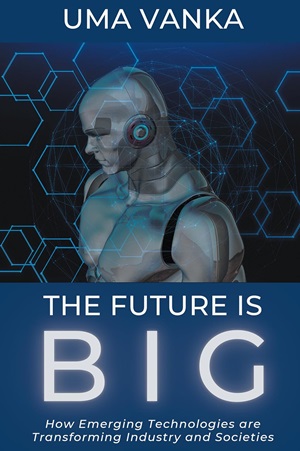
Uma Vanka strikes an interesting pose ideologically. He’s not a blind optimist to the polarizing issues his book explores. Nor does he adopt the kind of cautionary, foreboding tonality of an Elon Musk in this debate. Cautious optimism is the road he walks, a fine line when you think about it intellectually speaking. Yet when you read a copy of his new book, entitled The Future is BIG: How Emerging Technologies Are Transforming Industry and Societies, you can’t help but feel like someone with his position is probably the most easily trusted source for the kind of information regarding a technological paradigm shift. Vanka writes with this kind of giddy vigor, yet knows when to pull back and highlight the speedbumps ahead.
ABOUT THE AUTHOR: https://umavanka.com/
He solidly belongs in the camp of those who believe not only in the inevitability of technology, but in the strong cases it makes for pro-social benefits with some careful deliberation involved. As a result, The Future is BIG: How Emerging Technologies Are Transforming Industry and Societies doesn’t possess the same amount of cinematic rigor as, say, New York Times bestseller author and roboticist Daniel H. Wilson’s Robopocalypse. Obviously, for now, that’s a good thing. But it does have the kind of kinetic energy of another, relevant pop culture analogy – Christopher Nolan’s Interstellar, fueled by the research and works of Kip Thorne.
There’s this sense of awe Vanka possesses because of his expertise in the topic. It’s not fawning like that expressed by those not intricately familiar with the materials, yet it’s nonetheless infectious because it feels so pure in conviction. There is so much to discover in an era where things are about to change in a manner further enhancing our world, best case scenario, and at a minimum – changing it irrevocably.
Yet as Vanka shows time and again, such change is consistent with the course of human history. For as long as there has been Man, there has been some form of innovation. In an era where everything has essentially become renderable in first world societies on the cloud, artificial intelligence, mass technological oversight, and mass technological interconnectivity are the next, logical steps in progression. “Technology is transforming every industry from their roots of fundamental operation to the leaves of their working culture.
Technology is going to dominate our lives completely like we have never seen before. Almost everyone on planet Earth will be impacted by technology directly or indirectly,” Vanka states in this vein. “Most importantly, it has become much more relevant for entrepreneurs and service seekers alike, especially jobs involving the creation of capital. There is absolutely no doubt about it.” He’s also willing to highlight the hard truths of this phenomenon, with a grim matter-of-factness. “The future of everything will have one thing in common—work reduction, one of the three Ws discussed earlier. Work reduction will take place in multiple ways, but certainly more automation will be a part of every industry.
AMAZON: https://www.amazon.com/Future-BIG-Technologies-Transforming-Societies/dp/1637424914
The question in everyone’s mind is: does it mean our jobs will be taken away? Let me try and address the elephant in the room. The answer to this question is yes. Most jobs as they stand today will disappear in the future. Pretty disappointing, isn’t it? How can the future be big if jobs are eliminated?… Admittedly, the picture I painted might be toward the grimmer side for you. However, the title of this book states the opposite. That’s because there is good news within all of this. The good news is what we reviewed thus far is just one side of the tech coin and sadly the side that gets most of the spotlight in the media and elsewhere.
The other side of the tech coin is bright and extremely hopeful. You should know how to see the other side and that’s exactly what I attempt to do.”
Cyrus Rhodes



























